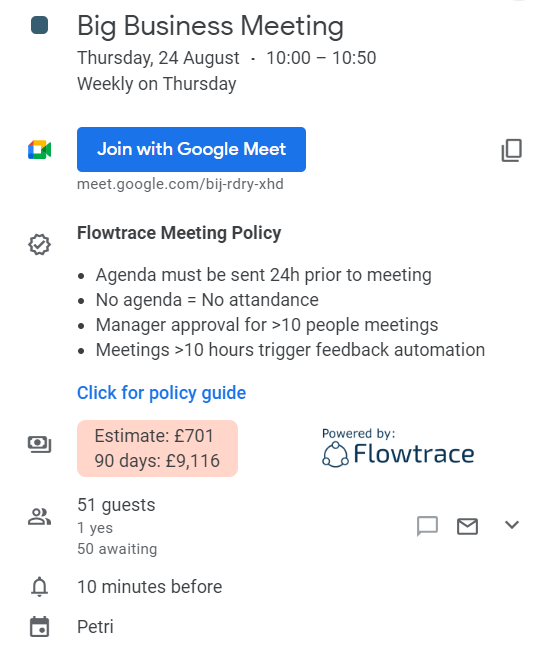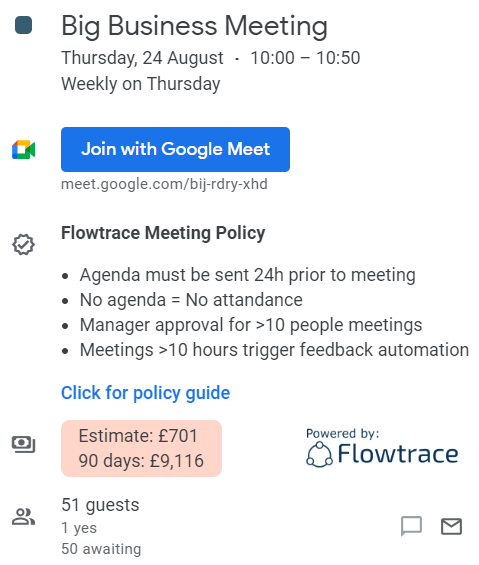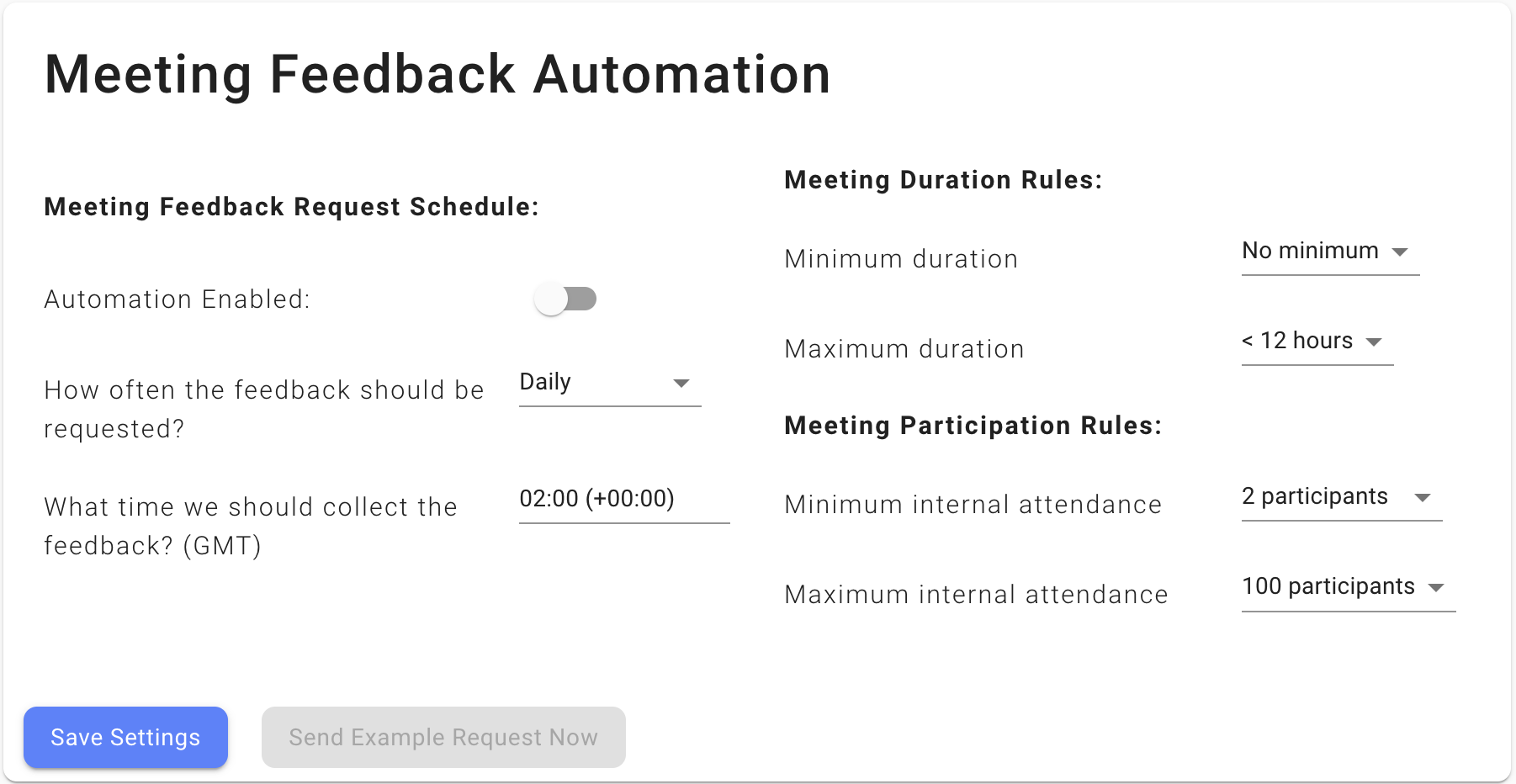What Are Calendar Analytics for Microsoft Outlook?
Enhance productivity and optimize time management with calendar analytics for Microsoft Outlook. Access valuable insights and tools for efficient...
Implementing meeting policies in Google Calendar can streamline efficiency and productivity in the workplace. Discover the benefits of integrating with Flowtrace.
In modern work environments, the efficiency and productivity of meetings have become a focus point. Structured meeting policies are the drive of this efficiency, ensuring that meetings are purposeful, time-bound, and productive. They provide a framework that guides organizations in conducting meetings that are structured and effective.
However, the challenge lies in effectively implementing and enforcing these policies. This is where tools like Google Calendar become indispensable, especially when integrated with tools like Flowtrace, making it easier for teams to adhere to structured guidelines.
Structured meeting policies have become essential in streamlining efficiency and productivity. With the changing nature of workplaces, especially with more remote and hybrid models, the absence of clear meeting rules can lead to significant time and resource wastage. Zippia reports a staggering loss of approximately $37 billion annually due to unproductive meetings, with workers spending an average of 31 hours per month in such meetings. These figures highlight the importance of implementing effective meeting policies.
Without set rules, meetings can often deviate from their intended purpose, becoming inefficient and counterproductive. This not only leads to direct financial losses but also affects employee morale and overall workplace productivity. Implementing meeting policies helps in setting clear expectations regarding the purpose, duration, frequency, and participation of meetings.
It ensures that meetings are purpose-driven, time-efficient, and include only relevant stakeholders. This approach minimizes the drift into unproductive sessions, effectively reducing the indirect costs associated with wasted time and diminished employee engagement.
In the context of understanding company meeting costs and their impact, the integration of well-defined meeting policies in tools like Google Calendar is not just a matter of convenience but a strategic necessity for leaders.

Effective meeting policies are crucial in ensuring that meetings are productive and contribute positively to an organization's workflow. Key components of a successful meeting policy include:
Duration and Frequency: Establishing guidelines for how long meetings should last and how often they should occur is vital. Meetings that are too frequent or too lengthy can be counterproductive.
Attendee Limit: Limiting the number of attendees to those who are essential for the meeting's objective can significantly enhance focus and efficiency. This approach ensures that meetings are more targeted and productive.
Agenda Requirements: A clear and concise agenda is imperative. It should outline the meeting's purpose, topics of discussion, and desired outcomes. This not only helps in keeping the meeting on track but also allows participants to prepare adequately.
Clarity and Flexibility: While it's important to have clear guidelines, it's equally important to maintain a degree of flexibility. This allows meeting policies to be adaptable to various situations and needs within the organization.
Implementing these key components can lead to more effective meetings, ensuring that they add value to the organization rather than becoming time-consuming formalities.
In setting up meeting policies in Google Calendar with Flowtrace, the process starts with the installation of Flowtrace's Chrome extension. This tool is key to integrating meeting policies directly into Google Calendar.

Once installed, it operates within Google Calendar, ensuring that meeting policies are actively applied during the meeting scheduling process. This integration enables real-time access and application of your organization's meeting policies, promoting structured and purposeful meetings.
Also, coupled with meeting analytics, this setup allows for ongoing assessment and evolution of policies, ensuring they remain effective and aligned with organizational objectives. This innovative approach embeds meeting policies into the fabric of daily workflows, making them an integral part of the meeting culture.
Effective management of meetings is crucial for the success of any organization. Implementing well-defined meeting policies can significantly enhance the efficiency, productivity, and overall performance of your team and the organization as a whole. Here are some key benefits of implementing meeting policies at the management level:
Improved Time Management: Meeting policies help establish clear guidelines on the scheduling and duration of meetings. By reducing the number of unnecessary or lengthy meetings, your management team can reclaim valuable time that can be redirected towards more strategic tasks and decision-making processes.
Enhanced Productivity: Well-structured meeting policies encourage focused and purposeful discussions during meetings. This ensures that meetings are productive, resulting in quicker decision-making and the achievement of important goals. Improved productivity among management cascades down to the entire organization.
Streamlined Communication: Meeting policies establish a structured framework for communication within the management team. This ensures that critical information is disseminated efficiently, and everyone is on the same page. Consistent communication leads to better alignment and execution of strategic initiatives.
Reduced Meeting Fatigue: Excessive and unproductive meetings can lead to burnout and decreased morale among management staff. Implementing policies that emphasize the importance of well-planned, relevant, and concise meetings can help mitigate meeting fatigue and boost employee engagement.

Cost Savings: Every minute spent in a meeting represents a cost to the organization in terms of employee salaries, overhead, and potential lost productivity. Meeting policies that prioritize efficiency can help reduce these costs and allocate resources more effectively.
Increased Accountability: Meeting policies often include guidelines for setting agendas, assigning action items, and following up on decisions made during meetings. This fosters a culture of accountability among management staff, ensuring that commitments are met and progress is tracked.
Better Decision-Making: Structured meetings with defined roles and responsibilities can facilitate more informed and effective decision-making. With clear protocols in place, management teams can deliberate, assess options, and make decisions that are in the best interest of the organization.
Improved Team Dynamics: Consistent adherence to meeting policies promotes respect for one another's time and contributions. This, in turn, enhances team dynamics and fosters a more collaborative and cohesive management team.
Adaptation to Change: Meeting policies can be adjusted and refined as the organization evolves. This flexibility allows management to adapt to changing business conditions, strategies, and objectives, ensuring that meetings remain relevant and effective.
Demonstrated Leadership: Implementing meeting policies demonstrates strong leadership and commitment to organizational excellence. It sets a positive example for the entire workforce and encourages other teams to adopt similar practices.
With such a diverse corporate landscape, where organizations have a variety of work cultures, the importance of tailoring meeting policies is vital. Each organization possesses its own unique set of values, communication norms, and work styles, and acknowledging these differences is key to optimizing the effectiveness of meeting policies.
Flexibility and customization are fundamental principles in the successful implementation of meeting policies across diverse work cultures. These principles offer several compelling reasons for their adoption.
Recognizing and respecting cultural differences is essential. Different cultures often have distinct approaches to communication, hierarchy, and decision-making. Tailoring meeting policies allows organizations to promote inclusivity and collaboration among their management teams.
The primary goal of any meeting policy is to maximize productivity. However, what works effectively in one cultural context may not be suitable in another. Customized meeting policies can be tailored to align with the specific work rhythms and preferences of your management team, ensuring that meetings are not only productive but also conducive to decision-making, regardless of cultural context.
Employee engagement is closely linked to the adaptability of meeting policies. When employees perceive that meeting policies have been customized to accommodate their work culture, they are more likely to engage actively in meetings, contributing their ideas and feedback more readily. This boost in morale fosters open and constructive communication.
Balancing formality and informality is another aspect that may require customization. While some cultures may prefer formal meetings with strict protocols, others may favor more informal gatherings. Flexible policies can strike a harmonious balance between these extremes, ensuring that meetings are comfortable and effective for all attendees.
Lastly, the ability to continuously refine and adjust meeting policies is crucial for their long-term relevance and effectiveness. Embracing flexibility allows organizations to iterate and improve these policies as they gain insights into what works best within their unique cultural context.
Maintaining and updating meeting policies is a critical aspect of ensuring their continued relevance and effectiveness. Here are some best practices for managing and evolving your meeting policies:

Incorporating meeting policies into Google Calendar can bring about numerous benefits for organizations. These policies enhance time management, boost productivity, and improve decision-making within management teams. By embracing flexibility and customization, organizations can tailor meeting policies to fit diverse work cultures, promoting inclusivity and innovation.
To ensure the ongoing success of meeting policies, it's crucial to regularly review and update them, gather feedback, and maintain open communication. Encouraging compliance and setting a leadership example are essential for policy effectiveness. In conclusion, adopting these practices for better meeting management can lead to a more efficient and collaborative work environment, ultimately contributing to an organization's overall success.
Enhance productivity and optimize time management with calendar analytics for Microsoft Outlook. Access valuable insights and tools for efficient...
Improve time management & meeting organization with calendar analytics for Outlook. Get insights into meeting culture, enhancing productivity &...
Discover how analytics can revolutionize meeting productivity by optimizing schedules, enhancing engagement, and driving strategic decision-making...